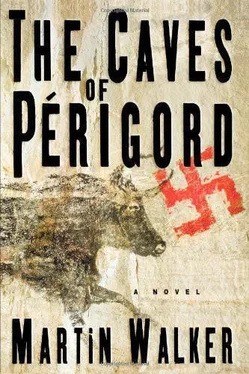Martin Walker - The Caves of Perigord
Здесь есть возможность читать онлайн «Martin Walker - The Caves of Perigord» весь текст электронной книги совершенно бесплатно (целиком полную версию без сокращений). В некоторых случаях можно слушать аудио, скачать через торрент в формате fb2 и присутствует краткое содержание. Жанр: Триллер, на английском языке. Описание произведения, (предисловие) а так же отзывы посетителей доступны на портале библиотеки ЛибКат.
- Название:The Caves of Perigord
- Автор:
- Жанр:
- Год:неизвестен
- ISBN:нет данных
- Рейтинг книги:4 / 5. Голосов: 1
-
Избранное:Добавить в избранное
- Отзывы:
-
Ваша оценка:
- 80
- 1
- 2
- 3
- 4
- 5
The Caves of Perigord: краткое содержание, описание и аннотация
Предлагаем к чтению аннотацию, описание, краткое содержание или предисловие (зависит от того, что написал сам автор книги «The Caves of Perigord»). Если вы не нашли необходимую информацию о книге — напишите в комментариях, мы постараемся отыскать её.
The Caves of Perigord — читать онлайн бесплатно полную книгу (весь текст) целиком
Ниже представлен текст книги, разбитый по страницам. Система сохранения места последней прочитанной страницы, позволяет с удобством читать онлайн бесплатно книгу «The Caves of Perigord», без необходимости каждый раз заново искать на чём Вы остановились. Поставьте закладку, и сможете в любой момент перейти на страницу, на которой закончили чтение.
Интервал:
Закладка:
“You are being very reasonable about this theft,” Lydia said when they were back at her apartment, sipping the malt scotch that had sat untouched in the cupboard since the end of the affair with David. “In your place, I would have been outraged.”
“Oh, I can be outraged if there is a point to it. But there isn’t,” said Clothilde. “I am fatalist about thefts, ever since I was burgled as a student. They are a fact of life. And if the police find the rock, then all will be well. But I doubt that they will, so we are left with an even deeper mystery. But then we had a mystery to begin with. Where did it come from, where is the cave of its origin, and why this bull, which is almost certainly by the hands of Lascaux, should be the only miniature we know of? That is three big mysteries that already confront us, and now we have a fourth. Who took it and why?”
“That makes five. Add a sixth-where is it now?”
“I assume an art thief who knew what he was doing somehow heard about the find and broke in. If so, he will try to sell it, and we may hear of it that way. Or when he realizes there is no market for these things, he will find a way to accept the reward we have offered. And then we are back where we started, examining the rock for any clues to its provenance. But I shall start on that next week. We have a national laboratory that does computer enhancement, and I already sent them your digital photos. I am almost certain already that this is no modern copy, but that should make sure. And since you photographed the backs and the sides of the rock, we have a chance to narrow down the geology.”
“I wish I shared your confidence. I keep thinking the thief could simply destroy it. Or we might never hear of it again. Remember that this rock has sat in an Englishman’s home for fifty years, and nobody had the slightest idea that it existed. So presuming it does come from an unknown cave, its secret has been well kept.”
“That is the part of the mystery that intrigues me. It even excites me,” said Clothilde. “This Englishman worked with the Resistance in Perigord. So there are records. We can track down the people he worked with, ask the old men who still survive from those days. There are some friends of my father where I can make a start.”
“Was your father in the Resistance there?”
“Yes. He was shot by the Germans, but some of his old comrades are still alive.”
“I’m sorry, I had no idea.”
Clothilde shrugged and reached into her bag for another cigarette. “I never knew him. He was shot during the Liberation, a few months before I was born. And then my mother married again, after the war, so I had another father, a good man. A teacher, still alive. He and my mother still live in the district, and he writes about local history. He wrote a book that was quite controversial, about the Resistance. These things still matter, in France, to the old men and some of the politicians.”
“It must have made things complicated, when you and Horst were together. His being a German.”
“Not for me. I was born after the Liberation. So was he. These were things other people had done, not us. My adoptive father felt the same way. He liked Horst. But for my mother, it was difficult. And Horst is not very German, if you understand me. He is more like an American, in some ways. He studied in America, you know. He drove a French car, spoke French well-almost as well as he speaks English.”
“I rang him today with the bad news, told him not to bother to come to London because there was nothing to see. He was much more furious than you,” Lydia said. “He said he’d probably come over anyway, to talk to the owner, see if he could find out any more about where the rock came from.”
“That’s Horst,” Clothilde smiled, rather fondly. “Once he gets his teeth into something, he doesn’t give up easily. Maybe that’s the German in him. Or the scholar. And he’s right, what’s more. The Englishman who first had the rock is the key to this. We assume that he brought it back from the war as a trophy, from the Perigord. So either he found it, or somebody gave it or sold it to him. Your Englishman was no scholar, and his son thinks he was no expert on the caves and the paintings and never showed any more interest in the matter. So it seems logical that he did not find it himself. Somebody local must have helped him or shown him, and then had some very strong reason to keep quiet. And who did he know locally?”
“The Resistance,” said Lydia.
“Exactly. So that is where I shall start. But perhaps you could help, Lydia. There must be records here about his military career, where he served, where he was. Could you find that for me, and the names of any networks that he worked with, any reports that he wrote?”
“Yes, I’d like to do that. There must be records in France, too.”
“There are the Compagnons de la Resistance . They are like a club of the old comrades, and they must have archives and memoirs. I can ask them, as the daughter of a Resistance man. Maybe the Communists will have something. My father was with them from before the war. I think he might even have been a party member. A lot of them were, in the Resistance. I will ask my mother, although my stepfather might know more. He will certainly know all about the local records and archives. Then there is a place in Bordeaux, the Centre Jean Moulin , which is named after one of the Resistance heroes, the one who was caught and tortured by Klaus Barbie of the Gestapo. You remember the Barbie trial?”
“Vaguely,” said Lydia. “I never had much reason to be interested before. But I think I might be seeing the son again. He asked me to lunch, and I owe him an explanation about the theft. I can ask him what he knows about his father in the war.” Lydia refilled their glasses, and grinned at Clothilde. “He’s not bad-looking, if you like the military type. Officer and gentleman. No longer young.”
“The military does that to them, after a certain rank. They age years with each promotion. Catch them young, and they can be very exciting. But then they get accustomed to commanding things and become tiresome, unless you want to make the effort. And having taken one look at military wives, I never wanted to join them. Garrison towns and being polite to the general’s wife. Not for me,” she grimaced. “Do you like soldiers?”
“I never came across one before.”
“There is no sign of a man in your apartment,” Clothilde said directly.
“No razors in the bathroom, you mean?” Lydia laughed as she felt herself blushing. “The last time there was a man in my life, he was far too discreet to leave anything like that. He always carried a portable electric razor and a clean shirt.”
“I would not trust that type,” Clothilde sniffed. “Always ready for adventure. And that, in my view, is a woman’s prerogative.”
At the Savoy Grill, which Major Manners said was the only place he really knew for lunch in London apart from his club, Lydia solemnly handed him a company check for ten thousand pounds with her apologies for the loss of his possession.
“That is the value I placed on it. That is what our insurance therefore pays out, or will if they know what’s good for them, even though the rock was not placed in our storeroom,” she said, and sipped her champagne.
“I therefore owe you two thousand pounds,” he said, smiling. “Under the terms of our agreement.” He was wearing a town suit today, a good one in dark blue, a striped shirt, a tie that looked regimental. His handkerchief was still in his cuff. She could detect no aftershave, which pleased her. There was an awful lot of male cologne in the art world, and she did not care for it.
“No,” she said firmly. “That was contingent on my doing some work that resulted in the sale of your rock, or at least its amicable disposal in a way that left you with no further obligations to France or anyone else. That is hardly the case now,” she said, thinking of the band of journalists and TV cameras thronging the street outside the salesrooms. “But there is one thing that troubles me. You barely mentioned your father’s service in wartime France when we spoke. Now I find that the President of France makes a private visit to his funeral. You must have known France was very important to him.”
Читать дальшеИнтервал:
Закладка:
Похожие книги на «The Caves of Perigord»
Представляем Вашему вниманию похожие книги на «The Caves of Perigord» списком для выбора. Мы отобрали схожую по названию и смыслу литературу в надежде предоставить читателям больше вариантов отыскать новые, интересные, ещё непрочитанные произведения.
Обсуждение, отзывы о книге «The Caves of Perigord» и просто собственные мнения читателей. Оставьте ваши комментарии, напишите, что Вы думаете о произведении, его смысле или главных героях. Укажите что конкретно понравилось, а что нет, и почему Вы так считаете.












